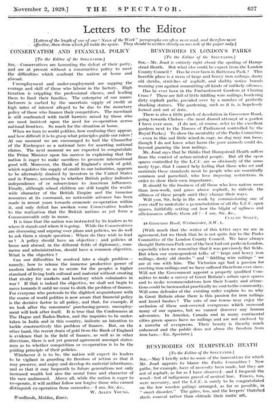Letters to the Editor
[Letters of the length of one of our" News of the Week" paragraphs are often m9re rend, and therefore m9re stifective,-than those which fill treble the space. They should be written clearly on one side of the paper only.]
"CONSERVATISM AND- FINANCIAL POLICY [To the Editor of the SPECTATOR.] SIR,—Conservatives are lamenting the defeat of their party, and are at present without a constructive policy to meet the difficulties which confront the nation at home and abroad.
' Unemployment and under-employment are sapping the Courage and skill of those who labour in the factory. High taxation is crippling• the professional classes, and leading them to limit their families. The' enterprise of our manu- facturers is curbed by the uncertain supply of credit at high rates of interest alleged to be due to the monetary policy of those who finance their competitors. The merchant is still confronted with tariff barriers raised by those who are most insistent upon the need for co-operation across national frontiers. So much for the situation at home.
When we turn to world politics, how confusing they appear, and how difficult it is to grasp what principles guide our rulers ! At one moment we are encouraged to hail the Chancellor of the Exchequer as a national hero for asserting national claims. The next moment we are expected to congratulate the Prime Minister upon his success in explaining that the nation is eager to make sacrifices to promote international good will. Moreover, the Bank of England's stock of gold, which regulates the supply of credit to our industries, appears to be alternately drained by investors in the United States and in France, according to whether British policy indicates independence of or subservience to American influences. Finally, although school children are still taught the world- wide 'character of the British Empire and the immense resources at its command, no noticeable advance has been made in recent years towards economic co-operation within it, and only defeat has awoken some Conservative leaders to the realization that the British nations as yet form a Commonwealth only in name.
It is time that the nation was instructed by its leaders as to where it stands and where it is going. While the Conservatives are discussing and arguing over plans and policies, we do well to ask them a simple question : Where do they wish to lead us ? A policy should have an objective ; and policies at home and abroad, in the different fields of diplomacy, com- merce and administration, should have a common objective. What is the objective ?
Can our difficulties be resolved into a single problem—
namely, how to release the immense productive power of modern industry so as to secure for the peoples a higher standard of living both cultural and material without creating that rivalry for markets and territory which culminates in war ? If that is indeed the objective, we shall not begin to move towards it until we cease to shirk the problem of finance. For everyone who pretends to the slightest acquaintance with the course of world politics is now aware that financial policy is the decisive factor in all policy, and that, for example, if we look after the consumers' purchasing-power, unemploy- ment will look after itself. It is true that the Conferences at The Hague and Baden-Baden, and the inquiries to be under- taken in India and in this country, indicate an intention to tackle constructively this problem of finance. But, on the other hand, the recent drain of gold from the Bank of England is evidence that in the field of finance, as well as in other directions, there is not yet general agreement amongst states- Men as to whether competition or co-operation is to be the guiding principle of their policies.
Whichever it is to be, the nation will expect its leaders to be vigilant in guarding its freedom of action so that it may preserve, and enjoy and develop its material inheritance, and so that it may bequeath to future generations not only increased wealth but also the moral force and character of the race undimmed. Above all, while the nation is eager to co-operate, it will neither follow nor forgive those who cannot distinguish co-operation from surrender.—I am, Sir, &c.,
Woodlands, Maldon, Essex.
W. ALLEN YOUNG.








































 Previous page
Previous page